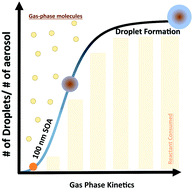Gas-phase kinetics modifies the CCN activity of a biogenic SOA†
Abstract
Our current knowledge of cloud condensation nuclei (CCN) activity and the hygroscopicity of secondary organic aerosol (SOA) depends on the particle size and composition, explicitly, the thermodynamic properties of the aerosol solute and subsequent interactions with water. Here, we examine the CCN activation of 3 SOA systems (2 biogenic single precursor and 1 mixed precursor SOA system) in relation to gas-phase decay. Specifically, the relationship between time, gas-phase precursor decay and CCN activity of 100 nm SOA is studied. The studied SOA systems exhibit a time-dependent growth of CCN activity at an instrument supersaturation of ∼0.2%. As such, we define a critical activation time, t50, above which a 100 nm SOA particle will activate. The critical activation time for isoprene, longifolene and a mixture of the two precursor SOA is 2.01 hours, 2.53 hours and 3.17 hours, respectively. The activation times are then predicted with gas-phase kinetic data inferred from measurements of precursor decay. The gas-phase prediction of t50 agrees well with CCN measured t50 (within 0.05 hours of the actual critical times) and suggests that the gas-to-particle phase partitioning may be more significant for SOA CCN prediction than previously thought.



 Please wait while we load your content...
Please wait while we load your content...